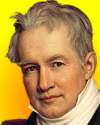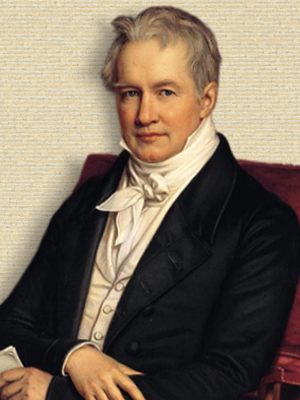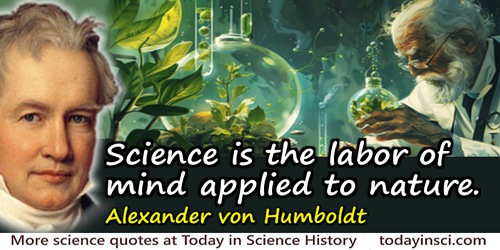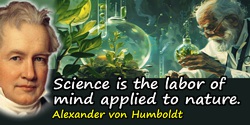 (source)
(source)
|
Baron Alexander von Humboldt
(14 Sep 1769 - 6 May 1859)
German natural scientist, archaeologist, explorer and geographer who made major expeditions to Latin America and Asia, and collected extensive geological, zoological, botanical, and ethnographic specimens.
|
Science Quotes by Baron Alexander von Humboldt (16 quotes)
By felling the trees which cover the tops and sides of mountains, men in all climates seem to bring upon future generations two calamities at once; want of fuel and a scarcity of water.
— Baron Alexander von Humboldt
In Alexander von Humboldt, Aimé Bonpland and Thomasina Ross (trans. and ed.) Personal Narrative of Travels to the Equinoctial Regions of America: During the Years 1799-1804 (1852), Vol. 2, 9. (Translated from the original in French.)
I shall collect plants and fossils, and with the best of instruments make astronomic observations. Yet this is not the main purpose of my journey. I shall endeavor to find out how nature's forces act upon one another, and in what manner the geographic environment exerts its influence on animals and plants. In short, I must find out about the harmony in nature.
— Baron Alexander von Humboldt
Letter to Karl Freiesleben (Jun 1799). In Helmut de Terra, Humboldt: The Life and Times of Alexander van Humboldt 1769-1859 (1955), 87.
Man cannot have an effect on nature, cannot adopt any of her forces, if he does not know the natural laws in terms of measurement and numerical relations. Here also lies the strength of the national intelligence, which increases and decreases according to such knowledge. Knowledge and comprehension are the joy and justification of humanity; they are parts of the national wealth, often a replacement for the materials that nature has too sparcely dispensed. Those very people who are behind us in general industrial activity, in application and technical chemistry, in careful selection and processing of natural materials, such that regard for such enterprise does not permeate all classes, will inevitably decline in prosperity; all the more so were neighbouring states, in which science and the industrial arts have an active interrelationship, progress with youthful vigour.
— Baron Alexander von Humboldt
Kosmos (1845), vol.1, 35. Quoted in C. C. Gillispie (ed.), Dictionary of Scientific Biography (1970), vol. 6, 552.
Science does not present itself to man until mind conquers matter in striving to subject the result of experimental investigation to rational combinations.
— Baron Alexander von Humboldt
In Alexander Humboldt and E.C. Otté (trans.), 'Introduction', Cosmos: Sketch of a Physical Description of the Universe (1852), Vol. 1, 76. The translator’s preface is dated 1844.
Science is mind applied to nature.
— Baron Alexander von Humboldt
In 'Introduction', Cosmos: Sketch of a Physical Description of the Universe (1849), Vol. 1, 64. Translation “under the superintendence of” Edward Sabine.
Science is the labor of mind applied to nature
— Baron Alexander von Humboldt
In Alexander Humboldt and E.C. Otté (trans.), 'Introduction', Cosmos: Sketch of a Physical Description of the Universe (1852), Vol. 1, 76. The translator’s preface is dated 1844.
Science only begins for man from the moment when his mind lays hold of matter—when he tries to subject the mass accumulated by experience to rational combinations.
— Baron Alexander von Humboldt
In 'Introduction', Cosmos: Sketch of a Physical Description of the Universe (1849), Vol. 1, 64. Translation “under the superintendence of” Edward Sabine.
That which we call the Atlantic Ocean is only a valley excavated by the force of the waters; the form of the seacoast, the salient and re-entrant angles of America, of Africa, and of Europe proclaim this catastrophe.
— Baron Alexander von Humboldt
'Esquisse d'un tableau geologique de L'amerique maridonale', Journal de Physique, de Chemie, d'Histoire Naturelle (1801), 53, 33.
The application of botanical and zoological evidence to determine the relative age of rocks—this chronometry of the earth's surface which was already present to the lofty mind of Hooke—indicates one of the most glorious epochs of modern geognosy, which has finally, on the Continent at least, been emancipated from the way of Semitic doctrines. Palaeontological investigations have imparted a vivifying breath of grace and diversity to the science of the solid structure of the earth.
— Baron Alexander von Humboldt
Cosmos: A Sketch of a Physical Description of the Universe (1845-62), trans. E. C. Due (1849), Vol. 1, 272.
The empirical domain of objective contemplation, and the delineation of our planet in its present condition, do not include a consideration of the mysterious and insoluble problems of origin and
existence.
— Baron Alexander von Humboldt
In lecture, 'Organic Life', collected in Cosmos, the Elements of the Physical World (1849), 348, as translated by E.C. Otté. Also seen translated as “The mysterious and unsolved problem of how things came to be does not enter the empirical province of objective research, which is confined to a description of things as they are.”
The philosophical study of nature rises above the requirements of mere delineation, and does not consist in the sterile accumulation of isolated facts. The active and inquiring spirit of man may therefore be occasionally permitted to escape from the present into the domain of the past, to conjecture that which cannot yet be clearly determined, and thus to revel amid the ancient and ever-recurring myths of geology.
— Baron Alexander von Humboldt
Views of Nature: Or Contemplation of the Sublime Phenomena of Creation (1850), trans. E. C. Otte and H. G. Bohn, 375.
There are no inferior races; all are destined to attain freedom.
— Baron Alexander von Humboldt
Webmaster cannot find a primary source for this as a brief quote. It is probably not verbatim, but does summarize the sentiment in the much longer quote (see this web page) which begins, “While we maintain the unity of the human species…”
To behold is not necessarily to observe, and the power of comparing and combining is only to be obtained by education. It is much to be regretted that habits of exact observation are not cultivated in our schools; to this deficiency may be traced much of the fallacious reasoning, the false philosophy which prevails.
— Baron Alexander von Humboldt
As quoted in Inaugural Address, Edward C.C. Stanford, 'Glasgow Philosophical Meeting' (8 Dec 1873), The Chemical News and Journal of Physical Science (2 Jan 1874), 7.
When Aloisio Galvani first stimulated the nervous fiber by the accidental contact of two heterogeneous metals, his contemporaries could never have anticipated that the action of the voltaic pile would discover to us, in the alkalies, metals of a silvery luster, so light as to swim on water, and eminently inflammable; or that it would become a powerful instrument of chemical analysis, and at the same time a thermoscope and a magnet.
— Baron Alexander von Humboldt
In 'Introduction' Cosmos: A Sketch of a Physical Description of the Universe (1860), Vol. 1, 52, as translated by E.C. Otté.
While we maintain the unity of the human species, we at the same time repel the depressing assumption of superior and inferior races of men. There are nations more susceptible of cultivation, more highly civilized, more ennobled by mental cultivation than others—but none in themselves nobler than others. All are in like degree designed for freedom.
— Baron Alexander von Humboldt
Cosmos: A Sketch of a Physical Description of the Universe (1845-62), trans. E. C. Otte (1849), Vol 1, 368.
While we maintain the unity of the human species, we at the same time repel the depressing assumption of superior and inferior races of men. There are nations more susceptible of cultivation, more highly civilized, more enobled by mental cultivation than others, but none in themselves nobler than others. All are in like degree designed for freedom; a freedom which, in the ruder conditions of society, belongs only to the individual, but which, in social states enjoying political institutions, appertains as a right to the whole body of the community.
— Baron Alexander von Humboldt
In Cosmos: A Sketch of a Physical Description of the Universe (1850), Vol. 1, 358, as translated by E.C. Otté.
Quotes by others about Baron Alexander von Humboldt (6)
But when on shore, and wandering in the sublime forests, surrounded by views more gorgeous than even Claude ever imagined, I enjoy a delight which none but those who have experienced it can understand. If it is to be done, it must be by studying Humboldt.
From letter to W.D. Fox (May 1832), in Charles Darwin and Francis Darwin (ed.), The Life and Letters of Charles Darwin: Including an Autobiographical Chapter (1887), Vol. 1, 207.
You cannot do without one specialty. You must have some base-line to measure the work and attainments of others. For a general view of the subject, study the history of the sciences. Broad knowledge of all Nature has been the possession of no naturalist except Humboldt, and general relations constituted his specialty.
Lecture at a teaching laboratory on Penikese Island, Buzzard's Bay. Quoted from the lecture notes by David Starr Jordan, Science Sketches (1911), 146.
During the first half of the present century we had an Alexander von Humboldt, who was able to scan the scientific knowledge of his time in its details, and to bring it within one vast generalization. At the present juncture, it is obviously very doubtful whether this task could be accomplished in a similar way, even by a mind with gifts so peculiarly suited for the purpose as Humboldt's was, and if all his time and work were devoted to the purpose.
In Hermann von Helmholtz and Edmund Atkinson (trans.), 'The Aim and Progress of Physical Science', Popular Scientific Lectures on Scientific Subjects (1873), 363.
[My dream dinner guest is] Charles Darwin. It’s an obvious answer, but it’s the truth. Think of any problem and before you start theorising, just check up whether Charles Darwin mentioned it in one of those green books sitting on your shelf. Whether it’s earthworms, human gestures or the origin of species, the observations that man made are unbelievable. He touched on so many subjects. Then, Alexander von Humboldt, the last polymath. There was no aspect of the natural world that he wasn’t curious about or didn’t write about in Kosmos, an extraordinary book.
From interview with Alice Roberts, 'Attenborough: My Life on Earth', The Biologist (Aug 2015), 62, No. 4, 16.
Every ambitious scholar, especially one who has already attained achievements equal to yours, is Humboldt’s son; we are all his family.
In Letter to Carl Ludwig (26 Jun 1849), quoted in Archiv für Kulturgeschichte (1959), 41, 178, footnote 36, as translated using Google from the original German, “Jeder strebsamec Gelehrte, um so mehr einer, der schon Leistungen hinter sich hat, gleich den Deinigen, ist Humboldt’s Sohn; wir alle sind seine Familie.” Also seen translated as “Every industrious and ambitious man of science, all the more so one who already has achievements like yours behind him, is Humboldt’s son; we all are his family”, in Galina Kichigina, The Imperial Laboratory: Experimental Physiology and Clinical Medicine in Post-Crimean Russia (2009), 64. Also seen paraphrased elsewhere, for example, as “Every scientist is a descendant of Humboldt. We are all his family”, in Laura Dassow Walls, The Passage to Cosmos: Alexander von Humboldt and the Shaping of America (2009), ix. The original letters exchanged by DuBois-Reymond and Ludwig are well documented.
The reader of Humboldt’s “Cosmos” follows the marches of a man whose eyes, ears, and mind are armed by all the science, arts, and implements which mankind have any- where accumulated, and who is using these to add to the stock.
In 'Wealth', Power, Wealth, Illusions (1860, 1875), 51
See also:
- 14 Sep - short biography, births, deaths and events on date of Humboldt's birth.
- Alexander von Humboldt - Combat with Electric Eels from Lives of the Brothers Humboldt (1852).
- Alexander von Humboldt: A Metabiography, by Nicolaas A. Rupke. - book suggestion.
- Booklist for Alexander von Humboldt.





 In science it often happens that scientists say, 'You know that's a really good argument; my position is mistaken,' and then they would actually change their minds and you never hear that old view from them again. They really do it. It doesn't happen as often as it should, because scientists are human and change is sometimes painful. But it happens every day. I cannot recall the last time something like that happened in politics or religion.
(1987) --
In science it often happens that scientists say, 'You know that's a really good argument; my position is mistaken,' and then they would actually change their minds and you never hear that old view from them again. They really do it. It doesn't happen as often as it should, because scientists are human and change is sometimes painful. But it happens every day. I cannot recall the last time something like that happened in politics or religion.
(1987) -- 


